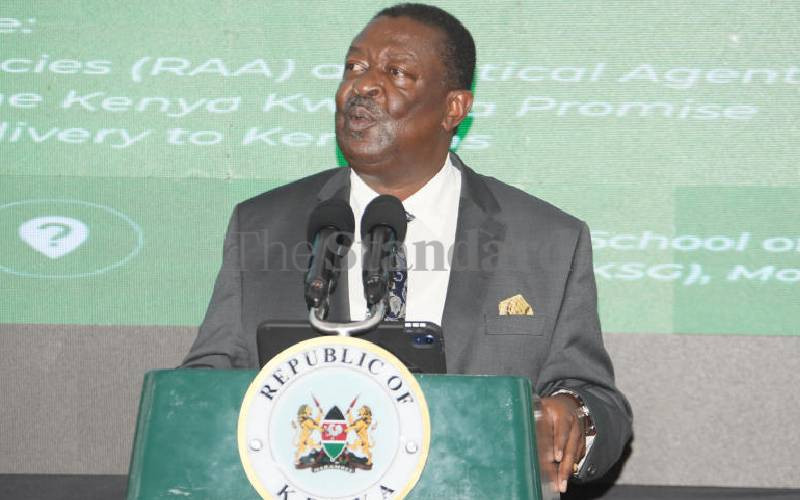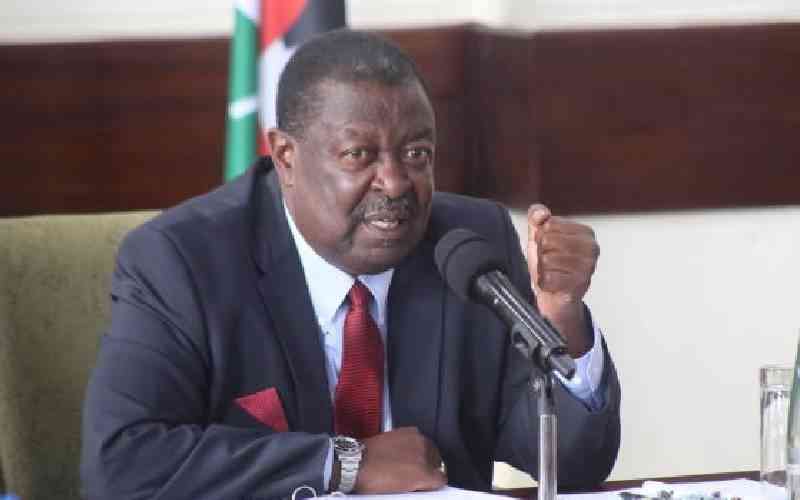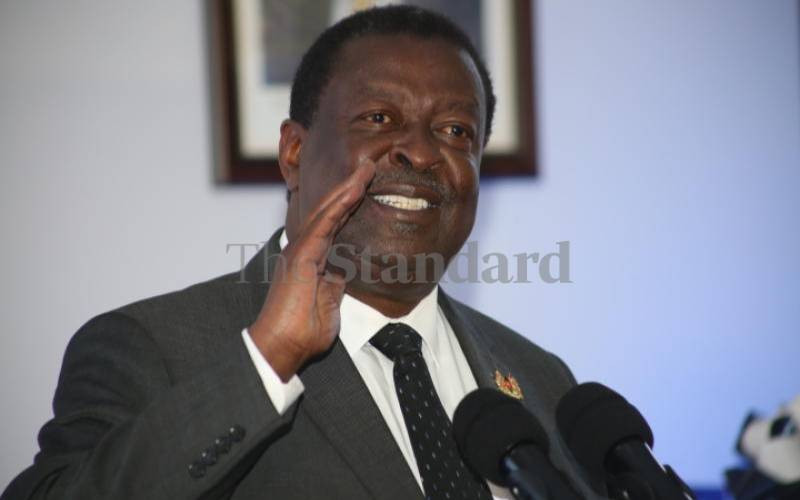By OSCAR OBONYO
The exclusion of former Deputy Prime Minister Musalia Mudavadi and former Justice Minister Eugene Wamalwa from the 18-member Cabinet of Jubilee Government has elicited despair among their supporters in Western Kenya.
Mudavadi and Wamalwa are only but representative political figures, but the bigger picture is that the move has ultimately dimmed the influence of members of the populous Luhya community in President Uhuru Kenyatta’s administration.
Reacting to the appointments of the last two nominees to the Cabinet, dejected politicians from western Kenya regretted that the Uhuru regime was giving wrong indications this early that it had no business with citizens from the region.
“As a community, we feel totally alienated by this Government and I can assure you this will have political consequences as we strategise over our next move within the next five years,” observes Vihiga Senator, George Khaniri.
While appreciating that nominating individuals to the Cabinet is the constitutional prerogative of the President and his deputy, Khaniri who is allied to Mudavadi’s United Democratic Forum (UDM), argues in the process of national healing the President must strive to form an all-inclusive Government.
But there are those who have no regrets for the exclusion of Mudavadi and Eugene from the Cabinet. The two, they claim, are victims of their own selfish greed “after entering into a secret deal with Kenyatta and Ruto and failing to deliver”.
Political auction
“We have no business mourning over the fate of two individuals who in their attempt to politically auction the community failed on both ends – to convince us and to deliver to their outsider masters,” berates an MP from Bungoma County, who declined to be named.
But the leader of the Federal Democratic Party Cyrus Jirongo says the question is not primarily about Mudavadi and Eugene. The bigger picture, he observes, has to do with the Jubilee leader who he accuses of exercising politics of exclusion.
“We got into the 2007 poll mayhem because of the politics of exclusion and President Kenyatta appears to be exercising the same, and even worse. When we pay tax, we do it to enable the President serve all of us equally and it is wrong to discriminate against some since we all pay tax,” he retorts. Jirongo, who unsuccessfully vied for the seat of Senator of Kakamega County, also opines that the last elections have provided “useful lessons” to members of the Luhya community.
“Our people must now come to terms with the fact that politics is a ruthlessly selfish game. Like the rest, we must learn to put our votes in one basket or else become as politically irrelevant as the Baganda in the neighbouring Uganda, who despite being the majority, are politically at the mercy of smaller tribes,” he warns. With just one member from the community, Prof Judy Wakhungu who is Environment, Water and Natural Resources Cabinet Secretary, this is indeed the very first time since independence for the Luhya to be under-represented in the Cabinet.
In fact, according to Khaniri, the Luhya have “zero representation” in the Cabinet: “Although our dear sister (Wakhungu) was born among us in Bungoma County, she no longer has a home here, as she is married in Central Kenya.” For the last half century, the Luhya have had sizeable representation in the Cabinet, right from the first 15-member Cabinet that included, Makerere University trained Joseph Otiende as Education minister.
In subsequent Cabinet appointments and reshuffles, President Kenyatta maintained a split share of Cabinet slots for the Luhya according to their original three districts of Kakamega, Busia and Bungoma. Besides Otiende from Kakamega, James Nakhwanga Osogo and Masinde Muliro, were accommodated in Mzee’s early Cabinets.
These numbers improved during the reign of retired President Daniel arap Moi. And even at one point under the Narc Government of former President, Mwai Kibaki, there were more ministers from the Luhya community than even from Kibaki’s own Kikuyu community.
Stay informed. Subscribe to our newsletter
This was achieved following two political formations under Kibaki’s National Alliance Party of Kenya (NAK) and former Prime Ministers Raila Odinga’s Liberal Democratic Party (LDP). Following a merger of the two wings under the Kibaki-led Narc Government, the Luhya dominated the 29-member Cabinet.
Since independence, the Luhya have had a heavy presence in Government, courtesy of what many perceive as their democratic voting pattern. By splitting political support to key players, they have all along succeeded to be in Government either way.
This is unlike the other populous Kikuyu and Luo communities that traditionally rally behind their own and have separately stayed “out” of Government at some point.
Top seat
But this time around the trick did not work as Mudavadi complicated the arithmetic by vying for the top seat. The Luhya vote was accordingly split between Raila and Mudavadi, who finished second and third, according to the electoral body.
Although the two former ministers are not members of the Jubilee Coalition, they signed a post-election deal with President Kenyatta and accordingly had expectations, including appointment to the Cabinet.
“Truth be told – we are not happy as party. The honourable Wamalwa had a deal with these gentlemen (President Uhuru Kenyatta and Deputy President William Ruto) and during the post-poll deal we further made just one request to the President – that he should make sure our boss gets a comfortable placement,” reveals New Ford-Kenya Secretary General, Col Benjamin Muema.
The NFK official believes his party boss is being fought politically because some people are threatened by his (Wamalwa’s) exuberance, charisma and “that if his star rises in government, it should be dimmed or even extinguished”
“As a party we have taken it on the chin, we will roll down as a party and rise, dust ourselves and move on,” he says. But noting that it is constitutionally still possible for the President to make more appointments to the Cabinet, including other slots, Khaniri hopes the President will do just that to accommodate the isolated communities in his Government.
 The Standard Group Plc is a
multi-media organization with investments in media platforms spanning newspaper
print operations, television, radio broadcasting, digital and online services. The
Standard Group is recognized as a leading multi-media house in Kenya with a key
influence in matters of national and international interest.
The Standard Group Plc is a
multi-media organization with investments in media platforms spanning newspaper
print operations, television, radio broadcasting, digital and online services. The
Standard Group is recognized as a leading multi-media house in Kenya with a key
influence in matters of national and international interest.
 The Standard Group Plc is a
multi-media organization with investments in media platforms spanning newspaper
print operations, television, radio broadcasting, digital and online services. The
Standard Group is recognized as a leading multi-media house in Kenya with a key
influence in matters of national and international interest.
The Standard Group Plc is a
multi-media organization with investments in media platforms spanning newspaper
print operations, television, radio broadcasting, digital and online services. The
Standard Group is recognized as a leading multi-media house in Kenya with a key
influence in matters of national and international interest.








